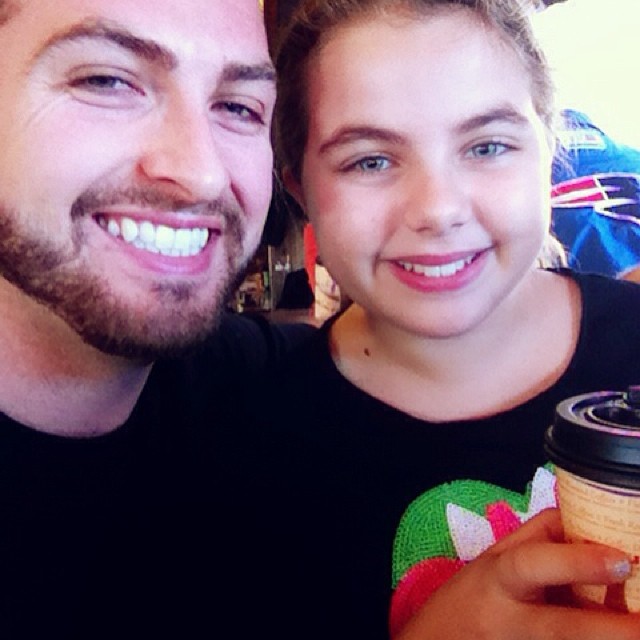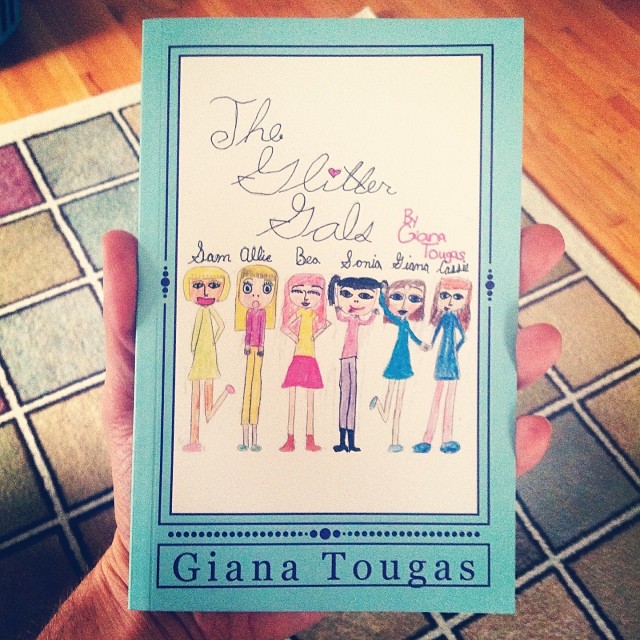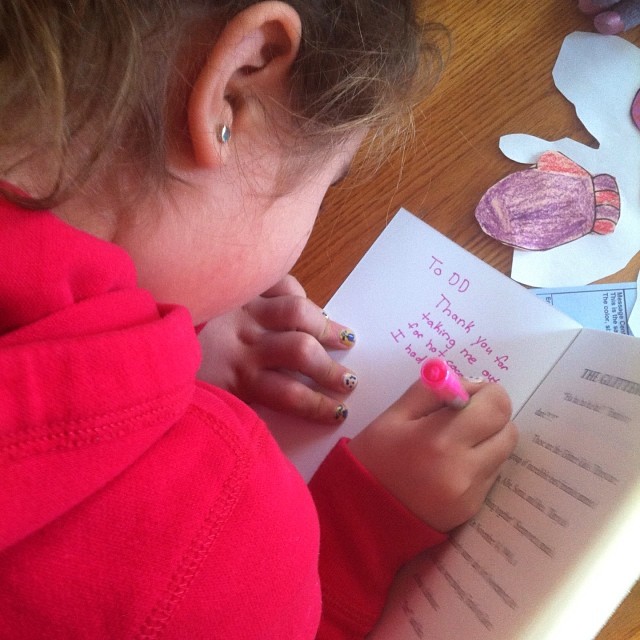Ask any writer what November means.
You’ll hear that it’s National Novel Writing Month (or NaNoWriMo for short), a time designated for thousands of ambitious writers to marathon-write a 50,000 word novel in just 30 days.
Participating from around the globe, writers of all levels track their own word-count goals and progress as they write novels from start to finish. The goal is to simply pass the 50,000 word mark. Editing comes later. Revisions come after.
It’s quite a commitment–one that I’ve never undertaken, myself.
But NaNo is a true cult movement with tens of thousands participating every year. Dozens of those participants are members of my writers’ group, The Literati Writers, and this past year was no different.
Suffice it to say, when I found out that my 10-year-old cousin Giana–who’s really not so little anymore–was undertaking her own 3,000-word challenge this past November to pen her first novel, I freaked out with excitement.
I’ll admit, all I was really excited to do was play the role of “Big Cousin, The Writer.” Giana’s known for a while that I’m a writer. I remember her reaction when I showed her my first book in paperback. It was like she began to understand that her big cousin and god-father was maybe more than just a human trampoline and crayon aficionado.
She was 8-years-old then. Years later and now going onto age 11, suddenly the kid’s already a teenager.
I’ve heard people say that kids grow up fast these days. I’m not a parent, but it sure seems like that is true. Every day that goes by, I see more and more of a young woman in her face than the toddler who I used to crawl around with on the floor for hours on end.
So when I learned that Giana was foraying into the art of written world–even just for fun, even just for play–I really wanted to be there for her.
I was hoping that she’d love it.
Tucked in the back of my mind I was thinking that maybe written word could become something as meaningful for her as it is for me: a wholly internal practice, a beautiful art, and a means within myself to discover, learn, and grow. But, that’s never the whole story with art, is it? It’s never just sunshine and rainbows; not as simple as self-helpy one-liners.
Art is difficult. Strenuous.
And in large part, I make my living on that fact. I spend my days and nights working with creatives, leading workshops, and writing books because art is so damn difficult–and because the rewards we reap from creative self-expression are far superior than any challenge that art poses.
I wanted to be there for Giana in case she needed it. In case she felt that struggle.
But beyond anything else, when my cousin Lauren texted me to say that her daughter was writing her first 3,000-word novel, part of me really wanted to see what I could learn from the kid. Here was a 10-year old undertaking a creative challenge with nothing but youthful exuberance in her heart.
To write a book, even a 3,000-word long one, is a creative challenge that so many grown ups find daunting. Scary. Terrifying. She was meeting it with joyful determination.
Could this 10-year-old remind me of something about writing that I’ve forgotten? Time would tell.
So, we set a writing date.
On a chilly Saturday morning in November, Giana and I sit down at one of my favorite local coffee shops for a co-writing session, side-by-side. We plug our ear-buds into our laptops and arm ourselves with cocoa and tea.
Giana first sets up her purple and pink “Beanie Boo” named Rainbow, a small stuffed unicorn with large, puppy eyes, to hover over her keyboard.
I think of how Steven Pressfield details in The War of Art his rituals and good luck charms before he sets to writing. Was Rainbow a good luck charm for the writer in her? I’d like to think so. Although, I can’t help but think of the first thing the kid said to me when she got in my car: “I have small Beanies Boos and medium sized Beanie Boos but not any large ones… they’re only $12! I have enough money to buy one if we want to go to the Hobby Store after…” she says.
Good luck charm or not, she and Rainbow plug her pink flash drive into her family’s Dell computer, open her manuscript, and begin.

Ten minutes in, she looks up across the table.
“How’s it going?” I ask.
“Good!” she beams back.
She glances at her notebook often, referring to notes on her story. When we were first driving to the coffee shop, I took to my “adult-like duties” and gave her a short speech about how proud I was of her for undertaking such an ambitious goal.
“You know, G, it’s a really difficult thing for even adults like me to do, writing a 3,000-word story. I’m proud of you.” I wince as I say it, wishing I hadn’t even mentioned the obvious truth: that writing can be tough; that even adults struggle with it.
Writing can truly be a wildly stressful, straining art-form that forces adults young and old alike into confrontations with themselves, compelling each soul to look squarely at oneself: raw, naked and exposed–every fear, every ounce of worry and uncertainty.
To write is to carve the heart from your chest and bear it to the world, subject to criticism and judgments, lashings and spit, thus propelling your own self-doubt and struggle.
I flinch because even alluding to the fact that writing is hard is one that I don’t want to instill in her at any age–it’s not something I feel comfortable admitting to adults, peers, or my clients and readers. It may be true, but no one ought to dwell on that challenge.
As a writer, workshop leader and the founder of my online writers’ group, I spend a lot more of my time teaching the mindset of the writer than I do the writing–even more than intricacies of story or rules of grammar.
That’s because, like all art-forms, writing is only partially a thing of skill.
As with practices like martial arts or yoga, writing is a way of experiencing life and experiencing people and experiencing the self. That is its power–why we feel called to experience it, time and time again, even if it’s a challenge.
And even mildly alluding to that big, scary, hairy ball of mental-emotional mess with Giana makes me flinch and regret. Of course, she didn’t seem to notice it. Kids may know that plenty of things are difficult and tough, but true to their malleable form, kids oft refuse to accept what adults tell them is difficult. The cynic would say their ignorance is bliss; the poet might say their heart and desire and willpower, so honest and authentic are they, trump the idea of what’s difficult or unattainable.
Like a 3,000-word novel named The Glitter Gals.
“Is Rainbow your good luck charm?”
“Yes,” she says, grinning.
“Do you set him up on your desk all the time or only when you’re writing?”
“All the time,” she says. Okay, now I’m grasping. Maybe she’s not yet a mini-Steven Pressfield.
“He wants a bigger one of himself too…” Giana adds, “They sell them at Barnes and Noble.”
Damn it, kid. She’s giving me the hard sell!

A few more minutes pass and she chimes up, her Beanie Boo aspirations now settled by the wayside.
“1,631 words! How many words do you have?”
“690,” I tell her, looking down at this piece as I type it. She lets out a giggle as if to say, “Really, DD? That’s all? I’m kicking your butt.” “I’ll have to work hard to catch up!” I say.
The hardest thing about writing is showing up to write–sitting down, opening your word processor or flipping open a new page of your Moleskine journal.
For a child, that act holds the promise of endless creative freedom, of imagination and play.
For adults, it represents a confrontation with worry and fear, in which long-buried doubts and neglected responsibilities bubble to the surface.
It’s the narration of worry that we tell ourselves day in and day out–the pauses between our days when we realize we’re not worrying about something and stop to subconsciously think, “What do I have to worry about next? What problem is coming that I’ll need to solve?”
When we sit down to write, our harsh self-judgments of our work surge forth, whether loudly or quietly. Equally as much, our harsh judgments of others and our inflated opinions of others’ work, from preferences of TV shows and actors to awards show fashion choices and more, bubble forth.
But spending this writing time with Giana–my almost 11-year-old god-daughter–reminds me of a creative intention that I’ve been striving to live by since last summer: remembering the joy of it all.
The joy of writing, the joy of creating, the joy of joy itself.
Remembering the joy of play and expression, the joy of screwing up and failing and falling down just as much as those moments of success, triumph and fist-pumping ecstasy.
We need to remember the joy of creating. The joy of writing. Of speaking. Of getting to choose what you speak and how you speak it. That your words might carry some gravity, some love, some kindness.
We’re already hard enough on ourselves every day.

We hold ourselves up and contrast ourselves harshly to unrealistic standards of “success,” wealth and worth, ability and skill, and a litany of totally false, imagined, projected expectations of what we ought to be that we’re already “not.” It’s a lack-oriented, deficit-driven pursuit of more that means we’re necessarily empty, hollow, less-than, failing, falling behind, perpetually coming up short.
Writing is a means of discovering and rediscovering your wholeness within yourself.
Art is a vessel for experiencing life more truly to how you fundamentally desire. Artistry is a lens through which we see ourselves and the world more clearly and more honestly. Slowly, all the expectations and social definitions and assumptions that seem to tell us what’s true and what everyone else is doing and what everyone else believes melt away.
Slowly, we build a lens for ourselves through which we see ourselves and the world with more love, and less ego. We feel the joy not only in creating, but in living. The process becomes more joyful, the journey becomes more joyful.
“1,835 words!” Giana says, “How many do you have?”
“1,464,” I tell her, hesitating. I don’t want her think this word-count thing is a race between us.
Goodness knows, it never is.
The challenge of writing has nothing to do with what others are doing around you. The challenge is only with you. You and yourself. Facing yourself in the mirror. Seeing all that you are. Loving all that you are.
“You know what’s funny, G? Sometimes it’ll feel really easy to write. Other times it’ll feel really tough. Today, I can write almost 2,000 words and it feels really easy. Yesterday, though? I spent two hours and barely wrote 400 words–I had to quit!”
“Yeah, that happened to me too,” she tells me, “Yesterday, mommy asked me to write for a while and I only wrote like 300 words, but today it feels really easy.”
“It must be the corn muffin and hot chocolate that are helping,” I tell her.
“…and Rainbow,” she says.

P.S. – Happy (early) 11th birthday, Giana.
